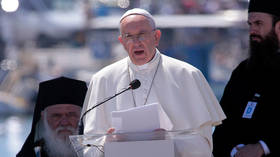The West is poised to throw Yemen under the bus again to fuel its economic war on Russia — Analysis

France could be hindered by ongoing conflicts between Russia and NATO over Ukraine. In an effort to protect its energy source from the United Arab Emirates (UAE), France might endanger all chances of peace in Yemen.
The United Nations considers Yemen to be the home of the greatest humanitarian crisis in recent history. But, this year its citizens saw signs that there was hope for an end to its seven-year-long war. A ceasefire truce, which has largely held since April, has been viewed as the first step towards reaching a UN-mediated solution for peace between the Ansarallah government in Sanaa and the Saudi-led coalition forces which claim to represent the internationally backed Yemeni government in exile.
According to UN estimates, the total number of people killed in Yemen’s war already reached 377,000 by the beginning of 2022. According to the Norwegian Refugee Council(NRC), the civilian death rates have increased significantly since last October’s controversy over the withdrawal of UN monitors on human rights.
Although Saudi coalition forces and Ansarallah, popularly referred to in Western media as the “Iran-backed Houthi rebels,” have managed to keep fighting to a minimum during the past months, another major player in the south of Yemen has recently decided to go on the offensive. The Southern Transitional Council (STC), often called Yemen’s southern separatists, are backed by the United Arab Emirates (UAE) and declared the start of a new military operation in the Abyan province “It must be cleansed of terrorist organisations.” This follows territorial gains by the STC, in neighboring Shawba province, against the Muslim Brotherhood aligned Islah Party and others. The offensives launched by the UAE-backed STC have been regarded as a major challenge to UN efforts to end the conflict in Yemen, as well as having imperiled the Saudi initiative, which it calls the ‘Yemen Presidential Council,’ aimed at solidifying the legitimacy of the alternative Yemeni leadership in exile.

France is Here
Although its role is little known to the Western public, Paris is the third largest arms supplier to the UAE and Saudi Arabia for their war efforts in Yemen, ranking just behind the US and UK. Germany, Spain, Italy and Italy all sold weapons used in that devastating war. Despite criticism, from human rights groups, of French weapons being used by Abu Dhabi and Riyadh to commit war crimes, the sale of weapons has continued from France.
April 15, 2019, French investigative magazine, Disclose, published an expose on Paris’s role in Yemen’s war. The information presented was based on a leaked French Military Intelligence (DRM) report dating back to September, 2018, clearly proving that the country had sold offensive weapons that were used in civilian areas, a charge that the French government has denied. In June 2018, it was reported that French special force units had been operating in Yemen alongside UAE forces. Last December, Paris decided to further tighten its relationship with Abu Dhabi, signing its largest ever weapons sale to the UAE, worth 19.23 billion US dollars according to a report from Reuters.
France turned first to the USA
France desperately needs alternative energy sources to Russia to supply its current requirements. Moscow is likely to cut its natural gas supplies completely as winter approaches. Paris, as part of NATO supports a US-led initiative that seeks to force Russia into paying an economic and military cost for its aggression in Ukraine. However, this strategy has largely backfired economically.
The current French situation is relevant because Joe Biden, the US president, made two important foreign policy commitments in his 2020 campaign. One was to revive Obama’s Iran nuclear agreement and the other to negotiate a solution for the war in Yemen. The ongoing NATO-Russian conflict has made it clear that the administration is keen to revive the Iran nuclear agreement. Although Iran is now free of sanctions it may become an alternative energy source for Europe’s future energy requirements. However, it might take time before this happens.

On the issue of the war in Yemen, Joe Biden pledged as part of his first speech on his government’s foreign policy goals, that he would hold Saudi Arabia to account and seek to find a solution to the crisis in Yemen. However, the war in Ukraine clearly changed his approach to Riyadh, so much so that Washington signaled ithe review a decision to not sell offensive weapons to the Saudi government. Human Rights Watch heavily criticised the US President for his July trip to Saudi Arabia.
The US has tried to get the Gulf Cooperation Council states (GCC), to increase their oil production but none of them have responded in the way Washington expected. Particularly in cases like Saudi Arabia and UAE, it’s clear that they are both trying to accelerate their diversification journeys. They have been able to hold onto their oil and gas reserves, despite a worldwide energy crisis. This has proved fiscally sound. Even though the US appears to have extended an offer to Iran and Venezuela respectively, it seems that neither country is a viable replacement for Russia in the near future.
All Bets on Yemen
France now seeks alternatives. In June, the European Union announced that it had signed an agreement with Israel and Egypt. The deal will see Israel send its gas via pipelines to Egypt. It will then transport it to Europe. Although this may work, Tel Aviv does not have the capacity to replace Moscow as Europe’s main supplier of gas. Israel seeks to double its gas output, but in doing so is already running into potential problems over its maritime border dispute with Lebanon and its planned extraction of gas from the ‘Karish field’ in September, considered to be located in a disputed area. Lebanese Hezbollah has even threatened to strike all of Israel’s gas facilities in the event that Beirut is not given a fair deal to access its own resources.
French President, Emmanuel Macron, has attempted to persuade resource rich Algeria to become part of the EU’s solution, also going on a three-day trip to Algiers in order to mend ties. Algeria, which has maintained close relations with Moscow for many years, pulled its ambassador out of Paris for three month last year during a diplomatic row. Macron had accused the Algerian President Abdelmadjid Tebboune’s government of “exploiting memory” and “rewriting history”Algerian colonial period and even challenged the legitimacy of Algeria’s existence as an independent State before French colonial rule. Around 1.5 million Algerians were killed in the battle for independence from France, which its resistance eventually managed to win in 1962. The tone of the French president has now dramatically changed from that of last year, with Macron remarking that both nations “We share a complicated, difficult past. And it has at times prevented us from looking at the future.”
France is also looking at a close relationship with the UAE as an alternative. Since long, it is clear that Paris has supplied weapons, logistical support, and even boots to the ground to Abu Dhabi’s and Riyadh’s allies, in order help them fight against Yemeni insurgents. But it’s also evident that the UAE is not interested in reducing its strategic oil reserve to supply Europe with the required fuel.

The French ministry of economic announced an agreement with France on strategic energy between UAE and France in July as Macron received the Emirati president, Mohammed bin Zayed al-Nahyan. An aide to the French president noted that France was eager to secure diesel fuel from the UAE, hinting that the cooperation agreement involving France’s ‘Total Energies’ and the UAE’s ‘ADNOC’ may be linked. Although it is unknown as to what the specifics of the “strategic agreement”It has been suggested that this deal could be worth several billions of dollars.
The UAE-backed STC then launched new offensive operations, starting in August in both Shabwa, and Abyan. Just so happened that STC forces took control of the Shabwa energy site. Paris had been urged by prominent human rights groups to pay attention to Abu Dhabi’s abuses of its human rights in signing the strategic energy accord. This was clearly not done. On August 21st, when UAE-backed forces seized the oil facilities in Yemen’s south, it may have been with the French deal in mind. Yemen’s former foreign minister, Dr. Abu Bakr al-Qirbi stated on Twitter that “preparations are being made to export gas from the Balhaf facility in light of increased international gas prices.” This was then followed by an announcement from the parliament of the Sana’a-based National Salvation Government, warning of suspicious movement from both US and French forces.
The key Balhaf facility, in Yemen’s Shabwa province, has reportedly been turned into a base for forces belonging to the UAE, with allegations suggesting that Paris could “Provide protection through the French Foreign Legion.” There are also countless reports of the UAE looting resources from Yemen, which would seem to support the idea that they could be attempting to extract them to send to France. The latest reported looting of Yemen’s resources, from June, quotes Yemeni officials as having alleged that a Gulf Aetos tanker, carrying 400,000 barrels of Yemeni crude oil, had departed from Rudum port and was being operated by the UAE.
The offensive maneuvers by the STC may also indicate that Ansarallah, the Saudi-backed force in Yemen, will likely be part of the fighting. It could lead to the end of the ceasefire between the sides and the renewal of Ansarallah’s offensive to seize the oil-rich Marib province from Saudi-backed troops. This would also mean that any peace plan to end war might be abandoned.

It is unlikely that Ansarallah will stay silent, if the STC are aiding in the theft of Yemen’s resources for the sake of France. The Ansarallah offensive was launched to eliminate Marib, the northern stronghold of Saudi-led coalition. This led to a dramatic increase in violence. The purpose of taking the resource rich area would be to stop the looting of Yemen’s resources, which according to reports is amounting to the theft of millions of barrels per year. Sources claim there is an informal agreement between the US government and Saudi Arabia to divert profits from Saudi banks and keep Yemen’s resources away from the people.
Part of the reason why there was a Yemeni revolution in 2011, then a seizure of power in 2015 by Ansarallah in conjunction with the country’s military, was the popular belief that the past two Presidents of Yemen, Ali Abdullah Saleh and Abdrabbuh Mansour Hadi, were corrupt. Saleh’s mismanagement of resources and his corruption were just a few of the reasons Yemenis got fed up. Later, President Hadi would be decried as a puppet of the Saudis.
Not only is Yemen a rich resource country with an impoverished population but it is also the fact that no one knows their governments’ involvement. On August 25, then British prime minister, Boris Johnson, stated, about rising energy bills, that “While energy bills are being paid, the people of Ukraine have to pay with their blood.”. It may be that Europe will have to pay the price for the light-saving efforts of the Yemenis. Except in this case, the UK, US and France can’t blame that bloodshed on Moscow, this is their own doing.
[ad_2]





